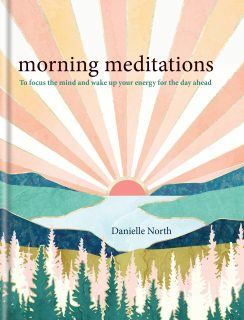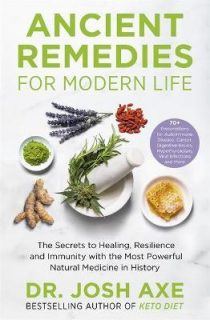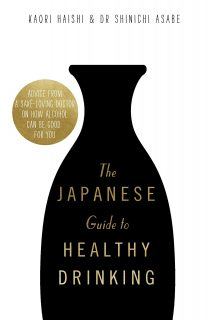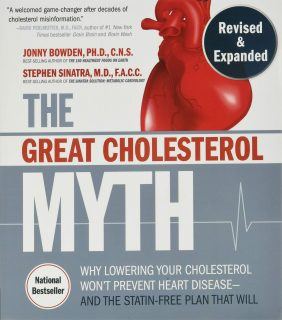We’ve selected our top 4 book choices for this August. Get reading for better health and longevity.
Book 1. Morning Meditations
 Danielle North is an executive coach, author, speaker, and founder of Pause Global, a transformational retreat and coaching company. Pause addresses the issues of business and lifestyle burnout. She has over 20 years of experience working with leaders and teams as an executive coach. Her latest book is Morning Meditations.
Danielle North is an executive coach, author, speaker, and founder of Pause Global, a transformational retreat and coaching company. Pause addresses the issues of business and lifestyle burnout. She has over 20 years of experience working with leaders and teams as an executive coach. Her latest book is Morning Meditations.
Studies have shown that people who develop a morning meditation practice find it easier to stay focused and energised throughout the day. They are also less likely to reach for unhealthy snacks and are more adept at warding off stress and anxiety.
North shares many useful tips on how to develop a practice. How essential oils will energize you in the morning and how to do simple breathwork. She also includes stretches and focuses journaling, as well as good morning tea blends.
Book 2. Ancient Remedies for Modern Life
 In this book, bestselling author Dr. Josh Axe explains how to treat more than seventy diseases, lose weight, and increase vitality with traditional healing practices passed down through the ages.
In this book, bestselling author Dr. Josh Axe explains how to treat more than seventy diseases, lose weight, and increase vitality with traditional healing practices passed down through the ages.
Dr. Axe explores the foundational concepts of ancient healing. From eating right for your type and living in sync with your circadian clock. You will learn how traditional practitioners identify the root cause of an illness, then treated it with medicinal herbs, mushrooms, CBD, essential oils, and restorative mind-body practices.
From ADHD, diabetes, hypothyroidism, autoimmune diseases, and more
What’s more, you will discover how to use these ancient treatments to cope with dozens of diseases, from ADHD to diabetes, hypothyroidism, autoimmune disease, and beyond.
Book 3. The Japanese Guide To Healthy Drinking
 Kaori Haishi and Dr. Shinichi Asabe have written this fascinating book. It contains advice from a sake-loving doctor on how alcohol can be good for you. This is an indispensable guide to avoiding or mitigating the damaging effects of drink
Kaori Haishi and Dr. Shinichi Asabe have written this fascinating book. It contains advice from a sake-loving doctor on how alcohol can be good for you. This is an indispensable guide to avoiding or mitigating the damaging effects of drink
Published originally in Japanese as The Best Way to Drink: Taught by a Sake-Loving Doctor, where it has sold over 95,000 copies, Sake journalist Kaori Haishi, with help from liver specialist Dr. Shinichi Asabe, has interviewed twenty-five doctors on how to drink without harming your health.
Does alcohol shrink the brain?
Based on a survey of 140,000 people, Haishi covers topics such as how the bitter taste of beer may help to prevent dementia, how having a regular nightcap may increase the risk of depression, and how the best remedy for a hangover is apparently natto (Japanese fermented soybeans). Haishi addresses questions such as: Does alcohol shrink the brain? Is drinking on a plane dangerous? And, why does someone repeat the same story over and over again when drunk?
She also provides health guidelines for women on drinking during menstruation, pregnancy, and menopause.
Haishi reveals the scientific connections between alcohol and various diseases, including fatty liver and breast cancer, and discusses the impact of too much alcohol on testosterone levels. She shows how too much turmeric can damage the liver, explains why medicine should never be taken with alcohol and how taking a bath after drinking in winter can prove fatal.
This is a book for anyone not looking to stop drinking altogether but to drink more moderately, or sensibly, without suffering ill effects.
Book 4. The Great Cholesterol Myth
 The Great Cholesterol Myth reveals the real culprits of heart disease. These include inflammation, fibrinogen, triglycerides, homocysteine, belly fat, triglyceride to HDL ratios, and high glycemic levels.
The Great Cholesterol Myth reveals the real culprits of heart disease. These include inflammation, fibrinogen, triglycerides, homocysteine, belly fat, triglyceride to HDL ratios, and high glycemic levels.
High Fat, Keto, Sugar, Genetics, and more
This best-selling book on heart disease has been updated with the latest research and clinical findings on high-fat/ketogenic diets, sugar, genetics, and other factors.
Compiled by best-selling health authors Jonny Bowden, Ph.D., and Stephen Sinatra, MD, it offers readers a four-part strategy that is indispensable. You can read the full interview with Jonny Bowden here: The Doctors Challenging The Great Cholesterol Myth.
Main Photo Credit: by Yuri Efremov on Unsplash



![women [longevity live]](https://longevitylive.com/wp-content/uploads/2020/01/photo-of-women-walking-down-the-street-1116984-100x100.jpg)










